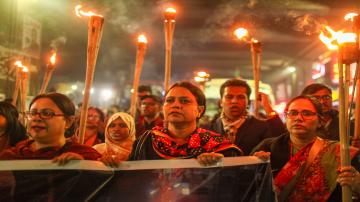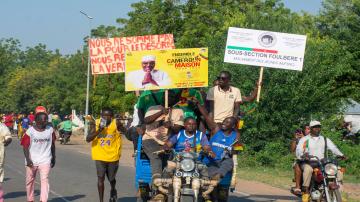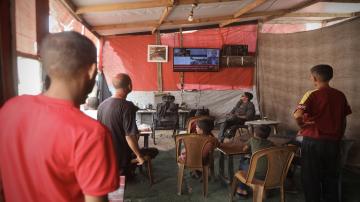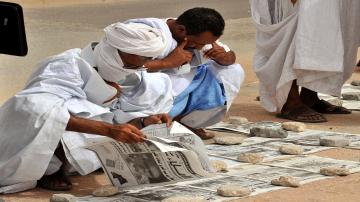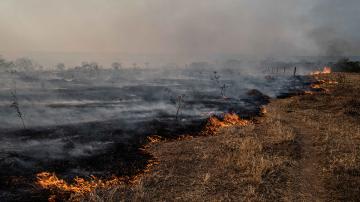Al Jazeera Journalism Review

Public Hostility Toward Legacy Media in Bangladesh
The December 2025 arson attacks on Prothom Alo and The Daily Star marked a turning point for journalism in Bangladesh. As public anger replaces state control as the primary threat, reporters are reassessing personal safety, editorial judgement, and professional credibility in a political transition where journalism itself is increasingly treated as an enemy.
Latest Articles
The Perils of Journalism and the Rise of Citizen Media in Southeast Asia
Southeast Asia's media landscape is grim, with low rankings for internet and press freedom across the region. While citizen journalism has risen to fill the gaps, journalists - both professional and citizen - face significant risks due to government crackdowns and the collusion between tech companies and authorities to enable censorship and surveillance.

Orientalism, Imperialism and The Western Coverage of Palestine
Western mainstream media biases and defence of the Israeli narrative are connected to orientalism, racism, and imperialism, serving the interests of Western ruling political and economic elites. However, it is being challenged by global movements aiming to shed light on the realities of the conflict and express solidarity with the Palestinian population.

Ethical Dilemmas of Photo Editing in Media: Lessons from Kate Middleton’s Photo Controversy
Photoshop—an intelligent digital tool celebrated for enhancing the visual appearance of photographs—is a double-edged sword. While it has the power to transform and refine images, it also skillfully blurs the line between reality and fiction, challenging the legitimacy of journalistic integrity and the credibility of news media.

Silenced Voices: The Battle for Free Expression Amid India’s Farmer’s Protest
The Indian government's use of legal mechanisms to suppress dissenting voices and news reports raises questions about transparency and freedom of expression. The challenges faced by independent media in India indicate a broader narrative of controlling the narrative and stifling dissenting voices.

Targeting Truth: Assault on Female Journalists in Gaza
For female journalists in Palestine, celebrating international women's rights this year must take a backseat, as they continue facing the harsh realities of conflict. March 8th will carry little celebration for them, as they grapple with the severe risks of violence, mass displacement, and the vulnerability of abandonment amidst an ongoing humanitarian crisis. Their focus remains on bearing witness to human suffering and sharing stories of resilience from the frontlines, despite the personal dangers involved in their work.

A Woman's Journey Reporting on Pakistan's Thrilling Cholistan Desert Jeep Rally
A Woman's Voice in the Desert: Navigating the Spotlight

Opinion
Arsalan Bukhari
Public Hostility Toward Legacy Media in Bangladesh
The December 2025 arson attacks on Prothom Alo and The Daily Star marked a turning point for journalism in Bangladesh. As public anger replaces state control as the primary threat, reporters are…
Salma Saqr
Migration Issues and the Framing Dilemma in Western Media
How does the Western press shape the migration narrative? Which journalistic frames dominate its coverage? And is reporting on anti-immigration protests neutral or ideologically charged? This…
Hisham Zakkout
From News Reporting to Documentation: Practical Lessons from Covering the War on Gaza
From the very first moment of the genocidal war waged by Israel on Gaza, Al Jazeera correspondent Hisham Zaqout has been a witness to hunger, devastation, war crimes, and the assassination of his…
Diaries
From News Reporting to Documentation: Practical Lessons from Covering the War on Gaza
From the very first moment of the genocidal war waged by Israel on Gaza, Al Jazeera correspondent Hisham Zaqout has been a witness to hunger, devastation, war crimes, and the assassination of his colleagues in the field. It is a battle for survival and documentation, one that goes beyond mere coverage and daily reporting.

A Sudanese Journalist in the Grip of the Rapid Support Forces
She was arrested, tortured, nearly raped, threatened with death, and subjected to degrading abuse. Her brother was brutally mistreated in an effort to locate her. In the end, her family had to pay a ransom to secure her release. She sought refuge abroad, but eventually returned to Sudan to continue documenting the war’s toll, particularly in El Fasher, a city now under siege. This is the harrowing account of a Sudanese journalist detained and tortured by the Rapid Support Forces.

Anas Al Sharif; Killed by Israel, but His Final Words Will Echo far Beyond His Death
For over a year and a half, Anas Jamal al-Sharif refused to leave northern Gaza, documenting the destruction and loss that others tried to hide. Tonight, Israel silenced his voice, but his final words, written on April 6, will echo far beyond his death.

Reports
Public Hostility Toward Legacy Media in Bangladesh
The December 2025 arson attacks on Prothom Alo and The Daily Star marked a turning point for journalism in Bangladesh. As public anger replaces state control as the primary threat, reporters are reassessing personal safety, editorial judgement, and professional credibility in a political transition where journalism itself is increasingly treated as an enemy.

Migration Issues and the Framing Dilemma in Western Media
How does the Western press shape the migration narrative? Which journalistic frames dominate its coverage? And is reporting on anti-immigration protests neutral or ideologically charged? This analysis examines how segments of Western media echo far-right rhetoric, reinforcing xenophobic discourse through selective framing, language, and imagery.
Polarised, Intimidated, Silenced: The Media Under Siege in Cameroon’s Election
Cameroon’s 2025 presidential election exposed a troubling paradox: a nation voting under the watchful eye of power, while its press remained silenced. From the arrest of a teenage reporter to bans on political debate and digital manipulation, freedom of expression is under siege, and journalism is on trial.

What Image of Gaza Will the World Remember?
Will the story of Gaza be reduced to official statements that categorise the Palestinian as a "threat"? Or to images of the victims that flood the digital space? And how can the media be transformed into a tool for reinforcing collective memory and the struggle over narratives?

Journalism in Mauritania: Behind the Facade of Press Freedom Indicators
Mauritania holds the top position in the Arab world in the Press Freedom Index published by Reporters Without Borders. However, behind this favourable ranking, the media and journalists face significant challenges, chief among them the ambiguity surrounding the definition of a "journalist" and the capacity of media professionals to fulfil their roles in accountability and oversight. Despite official efforts, the defining feature of Mauritania’s media landscape remains its persistent state of fluctuation.

How Can Journalism Make the Climate Crisis a People’s Issue?
Between the import of Western concepts and terminology that often fail to reflect the Arab context, and the denial of the climate crisis, or the inability to communicate it in clear, accessible terms, journalism plays a vital role in informing the public and revealing how climate change directly affects the fabric of daily life in the Arab world.








